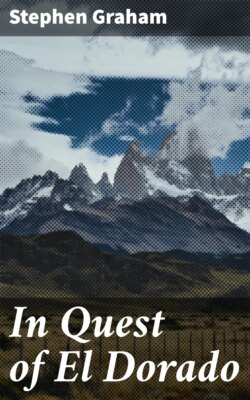Читать книгу In Quest of El Dorado - Stephen Graham - Страница 15
На сайте Литреса книга снята с продажи.
2
ОглавлениеTable of Contents
Each still night we seem to pass through something, as it were through mists and veils which are hiding something new. Each morning we rush on to the decks whilst they are still wet and the Castilian sailors are swabbing them. We peer with glasses over the virginal, fresh, foaming blue. The sailors go. The sun dries the timbers. We partake of coffee and smoke a sweet-scented Habana cigarette. The sailors return and pull up white canvas awnings at the cracks and at the sides of which glimmers blue of sky and brightness of sea. The children come out from their cabins to play, tumbling over their pet dogs. All is happiness.
The men indulge in a new sport to while away the time—they try to catch the fast-passing seaweed which lies in sponges and coils in the limpid sea. While Columbus took heart of grace because of the banks of seaweed his ship encountered, believing it a sign of the proximity of land, we on our Spanish ship making in prosaic fashion a bought-and-paid-for passage to the Indies, find the same seaweed a means of fun. Four or five Cubans and Spaniards take a bottle and a rope and a tangle of wire, and fish for seaweed from the bows. The weather-side gets quite a little crowd upon it, for the crew also take part in the joy of throwing out a bottle and wire to entangle floating green tresses of sea-maidens or big floating sponges of their toilets. Often the bottle flies through the air and often goes up the chorus of disappointment as it hits a wave instead of a bank of weeds. But the exultation is great when a tangle is caught and brought up on deck. It is very pretty and hairlike, and the little children press it between the pages of Ibañez' novels which form the only literature on board. That which heartened Columbus diverted us.
Then we entered the tropics and slept in the hot noontides, waking to clatter up on deck into the freshness of afternoon breezes. The evenings were very beautiful, sunset always giving a pageant. One night there came the most flaming and devastating sunset, descried beyond perilous and mountainous clouds, and from the north all the way to the west a grand processional mass of shadows was seen fleeing, like the pageant of the world's vanities going to judgment. To us it was poetry, but to Columbus and his companions it might well have suggested a growing nearness to the actual place of doom, to where the sun actually dipped down and went under the flat earth—a terrible thought, yet for a daring spirit a haunting and alluring one also.
I suppose there came a point in Columbus' voyage when he might as well keep on as turn back. Turning back became more terrible the longer they kept on. And curiosity must have fed on itself and increased. At any rate, it is still terrible to stand in the stern at night and look back. There in the darkness lies the past like a book that is read, or written, and a door that is shut. It breathes silence. The clamorous Old World is far behind and cannot be heard.
We started with a young crescent moon, and she grew to the full with us over the still ocean. The stars seemed to wave, and our mainmast jagging to and fro seemed intent on sighting and taking aim at the loveliness in the sky. We are escaping; we are going away; we are doing what they did; we are shooting the moon.
All the Cubans and Porto Ricans and Haitians seem to take on more life, become more vivacious. There is no mistaking it, they are nearing their homes. They have been as homesick for the Indies as the mariners were homesick for Spain. It's all in reverse order. "You'd like Habana—it's bigger and better than Barcelona," I am told; "yes, better than Madrid."
The ship comes into more humid airs, and in the evening all the passengers begin to croon Spanish songs. They are all together and happy, men, women, and children, and they feel they are getting near their blessed islands. It infects the crew, infects every one, like an extra idleness, till we come at last one night to a balmy and dreaming coast, where the coconut palms like cobweb dusters rise up to the low clouds of the sky, and the full moon through the mists shines in silver—from the waves to the shore. We are there at last. We have got to the other side.
The ship goes still and hoots. We have our last supper together. There is plenty of wine. "Drink deep," cry the Cuban passengers to those of us who disembark at Porto Rico. "It is ultimo vino, your last glass of wine."
"Porto Rico is not dry?"
"Oh, yes," say the Porto Ricans, mournfully. "You see, it belongs to the United States. Cuba is only under supervision of America, but Porto Rico belongs to her, and is dry."
"Seca! Seca!" they cry explanatorily in Spanish.
"Well, with the last glass, here's to Christopher Columbus, who discovered the island. He made the bridge from Old Spain and incidentally brought the first firewater too. All we who arrive, arrive after him."
